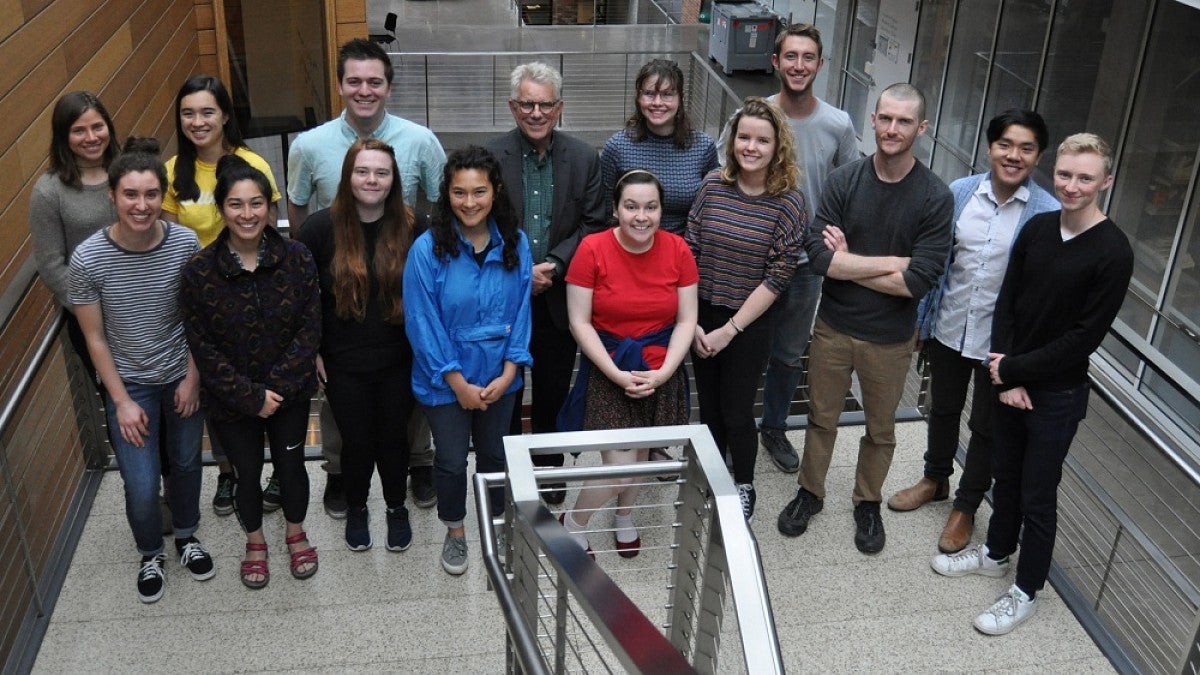Twenty-two UO undergraduate students have been awarded summer fellowships that allow them to dive deep into research projects.
The fellowship recipients are pursuing projects in a wide range of disciplines, everything from identifying the neuronal mechanisms for how the brain generates predictions about patterns of sounds to an anthropological study of how queer Muslims in Oregon navigate the intersection of political and sexual identity.
The awards span three different programs, the Vice President for Research and Innovation Undergraduate Fellowship, the Peter O’Day Fellowship in Biological Sciences and the P-Chem Undergraduate Fellowship.
“The summer break provides an opportunity for undergraduate students to focus exclusively on their research interests,” said Karl Reasoner, manager of the Undergraduate Research Opportunity Program. “These awards recognize students and their mentors for their scholarship and contribution to the university’s research mission.”
In addition to receiving the fellowship award funding, students participate in a series of workshops and seminars focused on career preparation, professional development and research communication.
The group model gives the fellows a shared experience with students who have similar interests but may come from majors outside their academic discipline. They learn from each other about how research is conducted across the university, how to overcome obstacles and how to take advantage of the campus resources and opportunities available to them.
Sixteen UO undergraduate students were awarded VPRI Undergraduate Fellowships, which allows students to conduct research, creative scholarship or complete work on an innovative project full time during the summer.
Four UO undergraduate and graduate student pairs were awarded Peter O’Day Fellowships in Biological Sciences, which is named after retired UO Department of Biology faculty member Peter O’Day and provides immersive, intensive and rewarding opportunities for students to perform research in the University’s many and diverse biological science laboratories.
Two undergraduate students were awarded P-Chem Undergraduate Fellowships, which is awarded annually to students conducting research in a physical chemistry lab.
VPRI Undergraduate Fellowship Recipients:
Kayla Walker, linguistics, “The Role of Semantic Predictability in Adaptation to Non-Native Speech.”
Abbey Ward, communication disorders and sciences, “Language Dominance in Bilingual Spanish-English Children.”
Arden Saravis, international studies and mathematics, “The Correlation Between Stigma Stemming from HIV and Antiretroviral Packaging: Design Recommendations for Introducing Discrete Packaging for Adolescents in Kenya.”
Konrad Bailey, psychology, “Neural and Behavioral Assays for Studying Predictive Coding in the Mouse Brain.”
Byron Lee, human physiology and biology, “Robo4 Project.”
Jacob Evarts, computer and information science, “Identifying New RNA-regulating Prions in Yeast.”
Anna Kulawiec, biology, “Differentiation Between PRC2 and H3K27 Methylation in Repression.”
Nora Kearns, human physiology, “The Influence of Maternal Fatty Acids and in Utero Inflammation on Child Behavior.”
Dagny Daniel, cultural anthropology, “Navigating the Intersections of Political and Sexual Identity: Ethnographic Interviews among Queer Muslims in Oregon.”
Sabrina Raqueno-Angel, human physiology, “The Effect of pH on Histamine Release.”
George Deardorff, biology, “Characterizing the Role of Dach During Bony Ray Branching in The Zebrafish Caudal Fin Skeleton.”
Hayli Brown, linguistics and Japanese, “Acoustic Sources of Accent in Second Language Japanese Speech.”
Kara Krnacik, economics, “The Effects of Abstinence-Only Funding on Teen Pregnancy and STD Rates.”
Adeline Fecker, biology, “The Influence of Sensory Systems in Social Behavior of Zebrafish.”
Nolan Rudolph, computer science, “New Capabilities for Self-Driving Networks.”
Chaney Hart, biology, “Dissecting the Role Cohesin Plays in Influencing the Structure of the Genome in Neurospora crassa.”
Peter O’Day Fellowship in Biological Sciences Recipients:
Emily Hill and Kaye Shek, “Linking Mycorrhizal Fungal Diversity with Pathogen Abundances in a Vineyard Agroecosystem.”
Jeanette Helgerson and Doug Foote, “Differences in Old and Young Patient Myoblast and Myotube Responses to Amino Acid Stimulation.”
Rennie Kendrick and Lea Frank, “The Effect of Blocked vs. Interleaved Training on Associative Inference.”
Sydney Kobak and Dylan Sieck, “Histamine and Cardiovascular Adaptation to Endurance Exercise.”
P-Chem Fellowship Recipients:
Madelyn Scott, chemistry and physics, “Quantifying Evolving Rates of Singlet Fission in TIPS-Pn During Molecular Aggregation.”
Jake Olsen, mathematics and chemistry, “Developing a Backmapping Procedure for Simple Coarse-Grained Polymers.”


